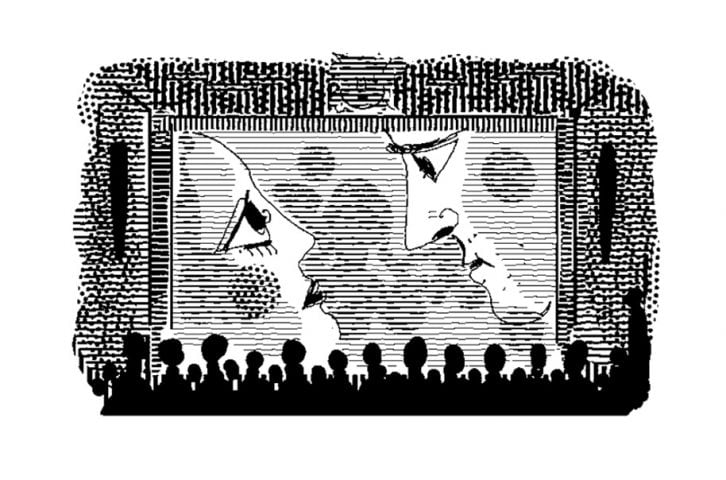Books Reviewed
The appearance of the word “hero” in the title of a sports biography is cause for immediate suspicion. Athletes, of course, can be heroes in the classic sense. Ted Williams was a highly decorated combat pilot in World War II and the Korean War who, in his spare time, became a Hall of Fame baseball player. Jackie Robinson displayed a different, but nonetheless very real, courage and dignity. For the most part, however, sports bios are given to embarrassing hyperbole, to celebrating a pitcher’s bloody sock as if it merited a Purple Heart.
This traditional athlete worship is not completely missing from Clemente: The Passion and Grace of Baseball’s Last Hero. David Maraniss says that when he was growing up, his favorite baseball player was Roberto Clemente, and the book reflects those treasured memories. But Maraniss means to write more than a fond reminiscence and his claims on behalf of Clemente invite more serious consideration. Maraniss is a Pulitzer Prize-winning journalist for the Washington Post, whose biography of Vince Lombardi is one of the best sports books ever written. Adopting the approach of social commentators like David Halberstam and Ken Burns, Maraniss looks to sports and sportsmen to understand certain characteristic American virtues and pathologies.
Clemente was a Puerto Rican native who played 18 years in right field for the Pittsburgh Pirates (1955-1972). He won four batting titles, a Most Valuable Player Award, and twelve Gold Gloves, awarded annually to the best defensive player at each position in each league. His last hit was number 3,000, a milestone reached by only 26 players in major league history.
Despite this impressive résumé, he is often overlooked in the standard rankings of the greatest players. Critics then and now point to his relatively low home run total (240) and on-base and slugging percentages (.359 and .475), and his relatively high number of outfield errors. Maraniss seeks to correct the record, especially for those too young to remember Clemente as a player. His prime exhibit of Clemente’s professional virtue is the 1971 World Series, won in seven games by the underdog Pirates over defending champion Baltimore. Clemente received the MVP award for batting .414, memorable clutch hitting, furious baserunning, and spectacular defensive play.
The mavens of baseball’s subculture of historians and statisticians have noted a number of errors of fact in Maraniss’s narrative of Clemente’s playing career. Their critique, aside from the usual nit-picking, is serious enough to caution one not to rely upon Clemente as an authoritative reference source for baseball during the 1950s and 1960s. But Maraniss’s argument for “heroism” does not rest on statistics alone. “There was something about Clemente that surpassed statistics, then and always.”
The Latinization of the American national pastime—and Clemente’s critical role in bringing that about—is the major subtext of the book. By his outstanding accomplishments on the field, his generosity, and the force of his personality, Clemente became the patron saint of Spanish-speaking players in the major leagues. He was not the first Latin player in the majors, but he paved the way for the influx and acceptance of athletes from the Caribbean and South America, many of whom have now become American citizens. For that community he was, and continues to be, a Spanish-speaking Jackie Robinson.
But what does Maraniss think Clemente means, or should mean, to his fellow Latin players and to his fans of all colors and ethnicities? Throughout the book, he stresses Clemente’s pride in his Puerto Rican heritage and portrays him as a man whose dignity came from a fierce attachment to that island’s distinct culture, history, and tradition of racial integration—self-consciously different from the U.S. mainland’s. Trying to help the reader understand that culture and its importance to Clemente, Maraniss quotes fondly the Puerto Rican poet Enrique Zorrilla:
Foreigners: make space
Because here, the Puerto Rican troubadour
Will sing with noble valor
Land, blood, name and race.
Land, blood, name, and race. Not exactly the American creed.
* * *
Unfortunately, Maraniss does not explore the implications of respecting Clemente (or anyone else) because of his strong assertions of racial, ethnic, and cultural identity. Clemente himself—a U.S. Marine Corps reservist—at least suggested other possible grounds of pride and self-respect. In some extemporaneous comments delivered in January 1972 to a banquet of fathers and sons in San Juan, he said, “I see myself sometimes wondering why some people still have to fight for their rights. As you people know, I have been fighting for my rights all my life. I believe every human being is equal. At the same time we have problems because we are a great nation…. I am from Puerto Rico, but I am also an American citizen…. I can tell you one thing, I won’t trade this country for no one country. We, no matter what, we have the best country in the world and you can believe it.”
But it turns out Maraniss is looking elsewhere for Clemente’s heroism, anyway. Toward the end of his book, Maraniss defines a hero as “someone who gives his life in the service of others.” Clemente seems to fit this definition because, besides his many large and small kindnesses to strangers and poor people of all colors, on New Year’s Eve 1972, just a few months after his three-thousandth hit, he was killed in the crash of an airplane delivering aid to earthquake victims in a devastated Nicaragua. Was that heroism? Or a tragic accident? Maraniss doesn’t bother asking, even as he never fully comes to terms with the important question that he does raise: what it is about his “passion and grace” that makes Clemente an American hero?




